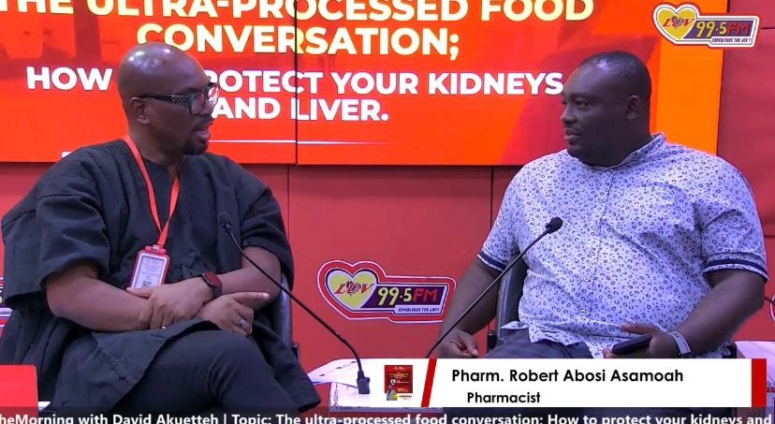Medical professionals are worried over the growing intake of ultra-processed foods among Ghanaians as the country grapples with increasing cases of non-communicable diseases.
Non-communicable diseases, including hypertension and diabetes, are attributed to regular or excess intake of ultra-processed foods which are high in salt, preservatives and chemicals.
Speaking on Luv FM, a pharmacist, Richard Abosi Asamoah highlighted the negative impact of these foods on the liver – an organ for detoxification.
“Processed foods have high salt in them, preservatives and chemicals which all have an effect on your liver due to how long they are kept and the containers the foods are stored in. Excess intake of processed foods or regular intake of processed foods is also dangerous for the liver because now the liver is working more so it becomes compromised,” he said.
Ultra-processed foods are industrially formulated edible substances derived from natural food or synthesised from organic compounds.
Sometimes called highly processed foods, they are a patchwork of ingredients, additives and preservatives that have been altered to include fats, starches, sugars, salts and hydrogenated oils extracted from other foods.
Research reveals that processed foods account for the larger portion of all foods in Ghana’s urban food environment with ultra-processed foods accounting for more than 30% of all processed foods.
Amidst the soaring cost of medication and treatment for diseases that come about as result of the regular intake of such foods, health professionals advise a shift from ultra-processed foods to natural meals that promote good health.
These foods are a threat to the liver’s function apart from the organ being attacked by pathogens.
Excessive drinking of alcohol, some antiviral drugs and the abuse of painkillers can also damage the liver.
“The liver helps in the maintenance of blood sugar levels in the food we ingest, so the higher the sugar the more likely your liver is at risk. The first signs your body shows when your liver is damaged are the jaundice eyes (yellow eyes) at the mild stage with weight loss and loss of appetite,” Mr. Abosi Asamoah said.
Liver conditions can be treated through the right ministering of medications but cannot be cured unless a liver transplant.
"We advise lifestyle changes, some of these soft drinks, carbonated drinks and the alcoholic drinks all give work to the liver to do because it is the liver that breaks them down," Mr. Abosi Asamoah added.
Latest Stories
-
Scars of Hooliganism: ‘It’s the worst thing you can think of’ – Maxwell Konadu on violence
9 minutes -
NIA workers declare strike action over withheld allowances
13 minutes -
Rehoboth Properties responds to allegations of power theft at Kweiman Estate
26 minutes -
Your social media activity can affect your student visa application – U.S. Consul General
33 minutes -
GJA elections committee chairman reaffirms commitment to credible polls
1 hour -
Visa denial is not deliberate; adhere to the rules – U.S Consul General
1 hour -
Part of Accra Sports Stadium still closed as NSA lacks funds for repairs
1 hour -
Haruna Mohammed calls for amendment of political parties act to enable financial independence
2 hours -
Stakeholders advocate professional development for teachers in the standards-based curriculum
2 hours -
Sheffield United invited entire Shooting Stars team for trials because of me – Rashid Fuseini
2 hours -
Do not apply for visa through agents; they are liars – U.S. Consul General
2 hours -
Quash order to restore Nii Adama Latse II – Nii Tackie Tsuru urges Supreme Court
2 hours -
Ghana Maritime Authority executes second successful offshore medical evacuation in months
2 hours -
Bond market: Turnover increased by 13.17% to GH¢1.33bn
2 hours -
Israel says Iran violates ceasefire, orders strikes on Tehran
2 hours

